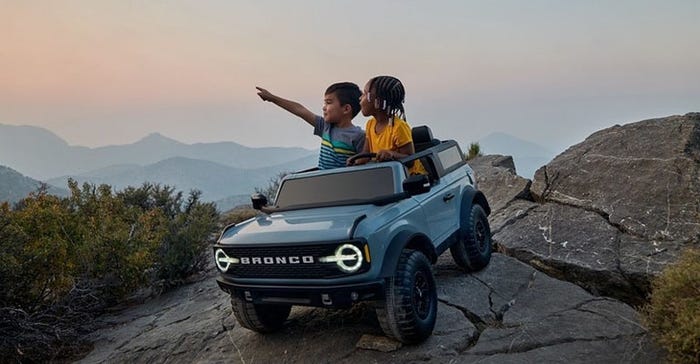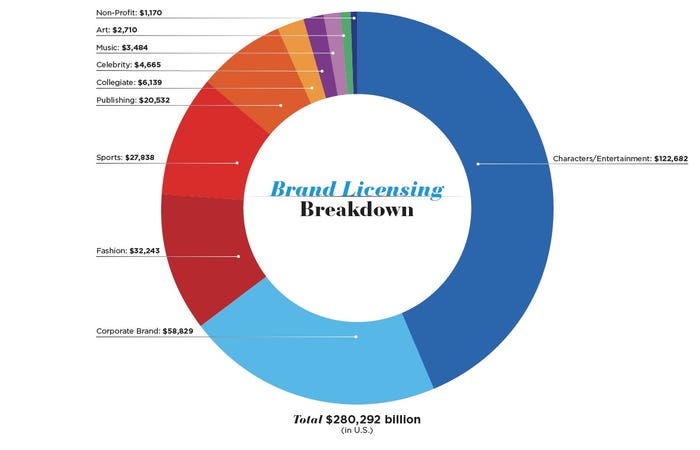The definition of brand licensing is the process of leasing a trademarked or copyrighted property for use in connection with a product, service, or promotion.
The property could be a name, likeness, logo, graphic, saying, signature, character, or a combination of several different elements.
The licensing agreements that property owners and licensees make have the potential to unlock powerful brands with in-demand products that drive real value to both parties.
Why is Brand Licensing an Important & Powerful Brand Strategy?
A walk down any shopping aisle illustrates the impact that brand licensing has on both the consumer and an increasingly diverse range of retailers, brands and manufacturers.
Licensing can extend a brand into new categories, areas of a store or into new stores entirely. It is a way for brand owners to increase their current fan base and move into new businesses without major investment in new manufacturing processes and also allows retailers and manufacturers to stand out from the competition and offer consumers the hottest brands as well as drive sales
From "Pokemon" action figures to NFTs featuring Crayola, the potential to leverage a brand for licensing or license out a beloved brand can deliver revenue and brand awareness to all parties involved. The licensing industry is valuable for both brand owners as well as retailers and manufacturers.
With the industry reaching over $292.8bn in sales in 2019, companies large and small are all reaching new heights thanks to licensed merchandise.
How do brand owners benefit from licensing?
Boosting awareness and marketing for core IP
Borrowing competency of licensees
Alternative to brand extension
Protect the brand across up to 45 different trademark classifications
Reach wider pool of consumers
How do retailers and manufacturers benefit from licensing?
Gaining the consumer awareness and marketing benefit of a well-known brand, character, logo, design, etc.
Reducing In-House costs
Enhancing authenticity and credibility
3 Examples of Brand Licensing
Funko

Funko has redefined what a collectibles company can do in the marketplace and proven that retail is very much alive, so long as you have what’s in demand. Aptly described as “fast fashion of pop culture” by Brian Mariotti, chief executive officer, Funko, the company deals primarily in bringing beloved licensed properties – from entertainment, sports and music to familiar, nostalgic corporate brands and mascots – to market largely via its Pop! vinyl figurines range, a core product offering and the company’s No. 1 seller.
V&A

The V&A works with licensees across Europe, the U.S., Japan, China and South Korea to spread the core values of the institute: making art accessible to all. It’s this core theme that drives the V&A’s work with designers and licensees to create valued, consumer-focused products.
Working with leading interior experts, craftsmen, designers and fashion creators, the V&A has produced innovative products such as children’s fashion lines with Little House of Hackney, paperback products based on English chintz fabrics with Pimpernel Press, tableware products with Caspari, Japanese textile-inspired needlepoint kits with Ehrman Kits and a range of gardening tools with Wild & Wolf.
Ford Motor Company

Whether it's apparel, toys, novelties or collectibles, the licensed product categories for auto brands run the gamut. Iconic, classic American brand Ford and its top-rated licensing program is successfully exploiting all categories.
“Ford Brand Licensing has a process in place to review license applications and also works with a variety of internal teams to determine key categories and growth opportunities in which we’d like to seek new partners for,” says Casie Ocaña, global brand licensing manager, Ford Motor Company. “When it comes to picking those partners, Ford looks to ensure the company shares the same values as well as passion for our products and consumers.”
Find further brand licensing examples here.
Who are the World's Biggest Global Licensors
The world’s top Brand Licensors and IP owners, by sales of Licensed merchandise:
Walt Disney
Meredith Corporation
Hasbro
Authentic brands group
Warner Media
NBCUniversal/Universal Brand Development
ViacomCBS
The Pokemon Company International
Bluestar Alliance
Sanrio
View the License Global Top Global Licensors 100 Report
Understanding Licensing Terms
Licensing – To give permission to a third party to use a legally protected intellectual property in conjunction with products, service, or promotion.
Licensee – The party – whether a manufacturer, retailer, service provider, or promotional agency – that is granted the rights to use the IP. (Ex.Funko, Wal-Mart)
License Agreement – The legal document signed by licensor and licensee that provides for the manufacture, sale and use of licensed product against agreed commercial terms, broadly known as the schedule
Royalties – The money paid to the licensor, usually paid on gross sales with a certain limited deductions.
Brand Licensing Verticals Explained
The 2019 Licensing International Global Licensing Industry report breaks the market down into the following categories:

The Big Three: Category Types
Character and Entertainment
The character and entertainment sector is without doubt the largest part of the global licensing industry, generating retail sales of $122 billion in 2018 and accounting for 44 percent of total global licensing sales*. Examples include:
Animated TV programs;
Feature film releases;
Characters and themes
Classic children’s book titles through to adult fiction
Song lyrics, music and theatrical production
Brand and Lifestyle
Brands and lifestyle is a growing sector of the global licensing industry both in terms of size and the number of blue-chip brands and organizations licensing out intellectual property in fields such as:
Corporate organizations;
Fashion houses and designers;
Museums, galleries and collections;
Charitable associations;
Sport clubs, national associations, and global sporting events;
Automotive;
Celebrities and
Food, drink and consumer goods
Art, Design and Image
Although smaller than the other sectors, art, design and image is perhaps the most diverse, It runs the gambit from smaller independent artists to top-tier photo collections.
The sector represented more than $2.7 billion of global retail sales of licensed merchandise in 2018. It’s highlighted artistic and illustrative styles include:
Designers;
Painters;
Illustrators and
Image libraries and collections
Is Licensing Right Strategy for Your Brand or Product?
One of the most widely held misconceptions is that barriers to entry are high because it is difficult to contact brand owners. Many think you have to be a business of a certain size and only the biggest companies will get all the best licenses. But licensing isn’t out of reach for smaller players, as long as you prepare and lay the proper groundwork.
Manufacturers and retailers seeking to become licensees need to decide if entering into a license agreement is indeed right for them. They should ask themselves:
What are the other successful brands / properties in a particular product category?
How open is the product category?
What are the best retail channels and positioning for the sale of the proposed licensed product(s)?
Who is the core consumer at these shops? Who are the owners and representatives of the property?
Who are they and how should you make contact? What are the obligations of a license agreement?
What is the approval process and does it factor in sufficient time for product development?
What is next?
Download the Essential Guide to Brand Licensing
To learn more about the licensing industry and take the next step for your brand or product, download the Brand Licensing Handbook to discover all the basics of the industry.
License Global created this guide for any professional looking to find out more about brand licensing. Whether you are a seasoned industry veteran or new to the field entirely, this handbook is designed to give you an overview of the business potential of licensing and highlight the value of brand extensions across verticals.
Continue your brand licensing journey with Licensing Unlocked
If you want to take your brand licensing journey one step further and continue learning, access module one of our unique in-depth training hub for free.
Licensing Unlocked makes brand licensing easy with video sessions, practical tools, and real-life case studies. The full course will launch very soon. In the meantime, enjoy the first module and equip yourself with the essentials!
In module one, 'Licensing Explained', Susan Bolsover (the brains behind Lightbulb Licensing) will:
Demystify brand licensing and industry jargon.
Reveal avenues for revenue generation.
Show you how brand licensing can bolster businesses from various angles.
Explain the essential players involved in the licensing process.
Unlock the first module for free and access the support you need to tap into this multi-billion-dollar industry today.
Learn more about the Training Programme
Stay Up to Date with the Latest Brand Licensing News
Create a License Global user account and gain access to the thousands of FREE licensing resources and top news from around the world. As part of your account, you will receive access to our daily newsletters on the industry and our complete catalog of tips, case studies and whitepapers.